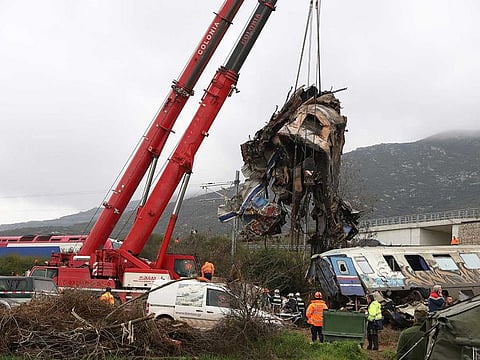Outrage grows as Greece admits ‘failures’ after deadly train crash
Local station master admitted negligence in Greece’s worst-ever rail disaster

Larissa: The Greek government on Thursday acknowledged failures in state management of its rail system, following a train collision that killed 57 and has triggered angry protests.
As crews continued to work in the charred wreckage at the crash site, the local station master admitted negligence in Greece’s worst-ever rail disaster and the government has apologised.
An investigation would examine the “chronic delays in implementing railway works, delays caused by chronic public sector malaise and decades of failure,” said government spokesman Yiannis Economou.
The crash happened late Tuesday when a freight and passenger train were allowed to speed towards each other for several kilometres before colliding near a tunnel outside Larissa in central Greece.
The 59-year-old station manager was arrested after officials determined “human error” was involved in the collision in which two carriages were demolished and a restaurant car caught fire, trapping many victims inside.
“I believe the responsibility, the negligence, the error has been confessed by the station master,” Economou told reporters in Athens.
Five years after the state-owned Greek rail operator Trainose was privatised and sold to Italy’s Ferrovie Dello Stato Italiane and became Hellenic Train, safety systems on the Athens-Thessaloniki line are still not fully automated.
Train unionists have said safety shortcomings for the Athens-Thessaloniki railway line had been known for years.
The country’s transport minister resigned Wednesday amid claims that safety warnings on the line had been neglected for years, and his replacement on Thursday offered his “apologies” to families of the victims and vowed a “complete evaluation of the political system and the state”.
“I want to say, while looking these people straight in the eye, that there will be an inquiry and everything will be presented to Greek citizens,” Giorgos Gerapetritis said.
A fire department spokeswoman told AFP that rescue crews had worked all night in search for survivors, but chances of finding more were dwindling.
“Time is not on our side,” she said.
‘Crumpled like paper’
After visiting the site Wednesday, Prime Minister Kyriakos Mitsotakis said that “Everything shows that the drama was, sadly, mainly due to a tragic human error”.
Passengers described scenes of horror and chaos from the crash, many dodging smashed glass and debris as the train keeled over, and breaking windows to climb out.
The train’s restaurant car erupted in flames after the collision, with temperatures inside reaching 1,300 degrees Celsius, the fire department said.
For hours after the crash it was not immediately clear how many people were on board, complicating efforts to determine how many are missing.
Roubini Leontari, the chief coroner at Larissa’s general hospital, told state broadcaster ERT on Thursday that over 10 people were still unaccounted for, including two Cyprus nationals.
TV footage from the wreck site showed a crane lifting the mangled remains of a carriage, under which a body was believed to be trapped.
“It was a student train, full of kids... in their 20s,” Costas Bargiotas, a senior orthopaedic doctor at Larissa General Hospital, told Skai TV.
“It was truly shocking... the carriages crumpled like paper,” he said.
Many bodies were charred beyond recognition and some victims were being identified only from their remains.
Seventeen biological samples have been collected from remains, and from 23 relatives seeking a match, the police said.
Angry protests
Angry demonstrators rallied outside the Athens office of Hellenic Train on Wednesday evening, as police used tear gas to disperse protesters who threw rocks at the building.
Earlier in Larissa, demonstrators held a silent vigil and brought white roses to form the word Tempe, the name of the valley where the accident took place.
Nikos Savva, a medical student from Cyprus, told AFP that the disaster was only a matter of time.
“The rail network looked problematic, with worn down, badly paid staff,” he said.
Authorities have declared three days of national mourning.
Hospitals in three cities - Larissa, Thessaloniki and Katerini - were treating the dozens of wounded, six of whom are in intensive care.
Hundreds of people also gathered in Larissa to donate blood needed to treat the injured.
The tragedy will loom large in the coming re-election bid by Prime Minister Mitsotakis, who was expected to announce an election for April.



